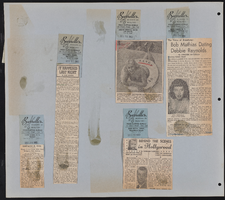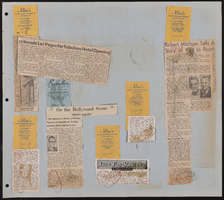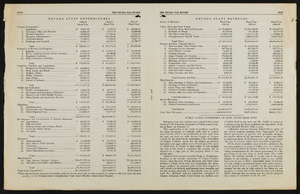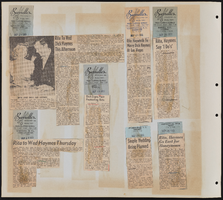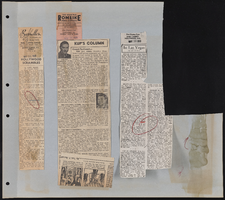Search the Special Collections and Archives Portal
Search Results

Transcript of interview with Mary Shaw by Barbara Tabach, September 2, 2011
Date
Archival Collection
Description
For the first 19 years of her life, Mary Martell Shaw called Central America home. Then thanks to misrouted luggage, she met the love of her life Rollin H. Shaw, a civil engineer, at a time in when his atomic energy career was taking off. In October 1943, they married in Costa Rica and for the next two decades traversed the country: Hawaii to California to Panama—wherever a project required Ronnie's engineering skills. Mary supported her husband every step of the way, with every new location. As a traditional homemaker of the era, she became adept at raising their four kids while packing boxes, enrolling them in school and setting up a warm home wherever they landed. The move to Las Vegas in September 1964, however, left her a bit challenged: there was a shortage of adequate housing, a concern for where to send her two daughters and two sons to school, and the feeling that they wouldn't be here long. Years later, Mary and Ronnie would retire to the city where their roots ran deepest, Las Vegas. With great wit, Mary recalls the long absences demanded by Ronnie's work with the Atomic Energy Commission. She also tells stories of the great fun they and their fellow Nevada Test Site employees had at parties, of her learning to paint with watercolors, and the pride she has of all her children's successes based on their education in Las Vegas.
Text

Jocelyn Cortez interview, March 18, 2019: transcript
Date
Archival Collection
Description
Interviewed by Nathalie Martinez. Jocelyn Cortez is a Salvadoran-American immigration lawyer. She grew up on the Eastside of Las Vegas and grew up going to school in the Clark County School District and at UNLV before going to Law School at the University of Arizona. She is an engaged community member as an immigration lawyer working alongside the Culinary Union and the Latino Bar Association.
Text

Transcript of interview with Mary Ellen Campbell by Ronald Robinson, March 6, 1977
Date
Description
On March 6, 1977, Ronald Robinson interviewed Mary Ellen Campbell (born 1886 in Panaca, Nevada) about her life in Nevada. Campbell first talks about her parents’ move to the United States from England and her own life growing up in Panaca. She also talks about living in Pioche and the conditions of living in these two small Nevada towns. Also present during the interview is Mary’s grandson, Allen Campbell, who sometimes asks a few questions as well.
Text

Transcript of interview with Otto Merida by Claytee White, May 18, 2017
Date
Archival Collection
Description
When looking back on his legacy in the Latinx community of Las Vegas, Otto Merida (1945 - ) takes great pride in being a Latin Chamber of Commerce [LCC] co-founder with Arturo Cambeiro. With the LCC, they forged a powerful economic entity that continues to provide the local Latino community with social and political influence. Growing up during the 1950s in Havana, Otto Merida fondly remembers his childhood despite living under the dictatorship of Fulgencio Batista. There were the murmuring sounds of explosions from afar on the way to baseball games, but also the warm Sunday family meals of Cuban soup with fideos. In this interview, he talks about the rising communist powers inspired by revolutionary Fidel Castro and the events that led his family to place him in the Peter Pan Program in 1961. The Peter Pan Program sent unaccompanied Cuban children to the United States to avoid potential instruction by Castro’s government. Merida still holds on to his mother’s final request upon leaving Cuba-“I want you to remember the address where we live and the phone number: Josefina 68-entre primera y segunda-La Víbora, Havana con el teléfono X4304.” As a part of the Peter Pan Program, Merida experienced a nomadic childhood living in barracks in Miami and a three-story home in Wilmington, DE. The only connection he had to his family were a series of letters he exchanged with his mother, until they reunited years later in Miami. For Merida, life on 79th Street and Biscayne Boulevard in Miami was defined by the values of his family and other Cubans and African Americans in his neighborhood. v Merida earned his bachelor’s degree in Political Science from the University of Florida. He credits his sister-in-law with a pivotal role in his decision to pursue a higher education. His engagement in politics continued through his involvement with the Cuban Circle, the first Hispanic community to be involved with politics in Las Vegas. He describes the migration of Cubans to the casino scene of Las Vegas and the presence of Cubans in the community. His work with the Cuban Circle inspired him to develop a political presence for Hispanics in the community. While travelling across the United States before settling in Las Vegas, Merida made many significant relationships while working with associations such as the Fitchburg Chamber of Commerce and Volunteers in Service to America [VISTA]. Living in Las Vegas, Otto Merida worked as an educator and community organizer. In the late 1970s, Merida and Arturo Cambeiro collaborated to create the Latin Chamber of Commerce of Las Vegas. For Merida, the Chamber consistently goes above and beyond the vision he and Cambeiro had created when they first opened their doors. From the creation of the Latino Youth Leadership Program at UNLV to their work alongside political figures such as Senator Catherine Cortez-Masto, Merida is extremely proud of the various accomplishments of the Chamber. Now as President Emeritus, Otto Merida continues to dedicate himself to the Chamber as a volunteer and serves as one of the many Latinx Voices of Southern Nevada that have shaped the greater Las Vegas community.
Text

Transcript of interview with Sonja Niekerk Walther and Wilma Vandenberg, November 20, 2017
Date
Archival Collection
Description
The documentation of the Holocaust of World War II reveals the desperation of Jewish families to protect their loved ones from doom. In this oral history, Sonja (neé Niekerk) Walter recalls the story of being an infant handed off to a family friend for safety and nurturing. Next to Sonja is Wilma, her “sister” and the biological daughter of that friend. Sonja and Wilma are tethered together by history and love for Cor Vandenberg, mother and protector. Sonja was born in 1943 Holland to Simon and Rose Niekerk. At thirteen days of age she was given sanctuary by Cor, who raise her as her own for the next two and half years. She and Wilma reminisce about the circumstances that brought them together, their love of Cor, and the impact of being a child survivor of the Holocaust. Sonja also shares her family’s journey to the United States and to Las Vegas.
Text

